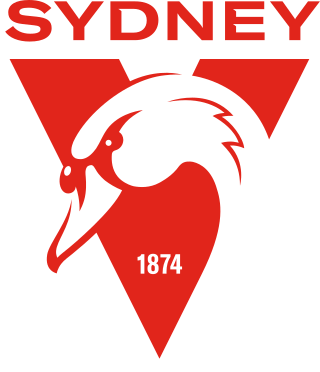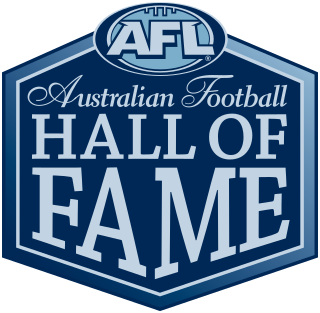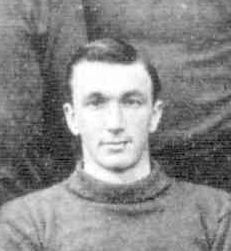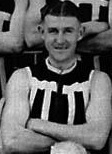Related Research Articles

The North Melbourne Football Club, nicknamed the Kangaroos or colloquially the Roos, is a professional Australian rules football club. The men's team competes in the Australian Football League (AFL), and the women's team in the AFL Women's (AFLW). The Kangaroos also field a reserves men's team in the Victorian Football League (VFL) and women's team in the VFLW.

The Sydney Swans are a professional Australian rules football club based in Sydney, New South Wales. The men's team competes in the Australian Football League (AFL), and the women's team in the AFL Women's (AFLW). The Swans also field a reserves men's team in the Victorian Football League (VFL). The Sydney Swans Academy, consisting of the club's best junior development signings, contests Division 2 of the men's and women's underage national championships and the Talent League.

Ronald Dale Barassi was an Australian rules footballer, coach and media personality. Regarded as one of the greatest and most important figures in the history of the game, Barassi was the first player to be inaugurated into the Australian Football Hall of Fame as a "Legend", and he is one of four Australian rules footballers to be elevated to the same status in the Sport Australia Hall of Fame.

The Brisbane Bears was the name for a professional Australian rules football club based in Brisbane, Queensland, now known as the Brisbane Lions. Granted a Victorian Football League license in 1986, it was the first privately owned club in the history of the competition and debuted in the 1987 VFL season.

The Australian Football Hall of Fame was established in 1996, the centenary year of the Australian Football League, to help recognise the contributions made to the sport of Australian rules football by players, umpires, media personalities, coaches and administrators. It was initially established with 136 inductees. As of 2024, this figure has grown to more than 300, including 32 "Legends". Jason Dunstall became the most recent inductee to achieve Legend status in 2024. There had previously been 32 official Legends prior to Dunstall's elevation, but disgraced player Barry Cable had his football honours rescinded after being found guilty of historical child sex abuse.

In England, Australian rules football is a team and spectator sport with a long history. It is home to the longest running Australian rules fixture outside Australia, the match between Oxford and Cambridge Universities which has been contested annually since 1923. All other current competitions originated in 1989 with the founding of what is now AFL London, the longest running Australian rules football league in Europe. The current governing body, AFL England, was formed in 2012 and expanded the game in 2018 to include the additional regional divisions: AFL Central & Northern England and AFL Southern England.

The Australian Football League (AFL) is the pre-eminent professional competition of Australian rules football. It was originally named the Victorian Football League (VFL) and was founded in 1896 as a breakaway competition from the Victorian Football Association (VFA), with its inaugural season in 1897. It changed its name to Australian Football League in 1990 after expanding its competition to other Australian states in the 1980s. The AFL publishes its Laws of Australian football, which are used, with variations, by other Australian rules football organisations.

In the Australian Capital Territory (ACT), Australian rules football is a popular spectator and participation sport which has been played continuously since 1911. With 9,129 adult and 2,953 children playing the sport, it has the fourth highest team sport participation after soccer, basketball and netball. The current governing body is AFL Canberra founded 1922 which runs the competition by the same name, while the development body is AFL NSW/ACT established in 1999.

In New South Wales, Australian rules football dates back to the 1860s colonial era, with organised competitions being continuous since the 1880s. It is traditionally popular in the outback areas of the state near the Victorian and South Australian borders— in the Murray Region, in the Riverina and in Broken Hill. These areas form part of an Australian cultural divide described as the Barassi Line. To the west of the line it is commonly known as "football" or "Australian Football" and to east of the line, it is promoted under the acronym "AFL" by the main development body AFL NSW/ACT. There are more than 15 regional leagues though some are run from other states, the highest profile are AFL Sydney and the Riverina Football Netball League. With 80,572 registered players, it has the third most of any jurisdiction.
The AFL Commission is the governing body of the Australian Football League Limited (AFL), its subsidiaries and controlled entities. Richard Goyder has been chairman since 4 April 2017, replacing Mike Fitzpatrick.
Noel Teasdale is a former Australian rules footballer who played in the Victorian Football League (VFL) and the South Australian National Football League (SANFL).

William Caldwell McClelland CBE was a medical doctor and an Australian rules football player and administrator. Born at Buninyong, on Victoria's goldfields, to an Irish-born father (David) and his Victorian-born wife (Mary), McClelland went to Brighton Grammar School and then to the University of Melbourne where he was resident at Ormond College. He graduated BA in 1899, MA in 1901 and MB, BS in 1905.
The 1964 VFL season was the 68th season of the Victorian Football League (VFL), the highest level senior Australian rules football competition in Victoria. The season featured twelve clubs, ran from 18 April until 19 September, and comprised an 18-game home-and-away season followed by a finals series featuring the top four clubs.
The 1980 VFL season was the 84th season of the Victorian Football League (VFL), the highest level senior Australian rules football competition in Victoria. The season featured twelve clubs, ran from 29 March until 27 September, and comprised a 22-game home-and-away season followed by a finals series featuring the top five clubs.
Michael Francis Nolan was an Australian rules footballer who played for the North Melbourne Football Club in the Victorian Football League (VFL). Because of his weight of 135 kg and height of 194 cm, Nolan was dubbed "The Galloping Gasometer" by commentator Lou Richards. Until the emergence of Aaron Sandilands in the early 2000s, Nolan was the heaviest ruckman to play VFL/AFL football. He was nevertheless surprisingly agile and regarded as one of the best "palm" ruckmen of the 1970s. Nolan had a long kick and was unusually effective, for a big man, in picking up the ball at ground level.
The 1980 VFL Grand Final was an Australian rules football game contested between the Richmond Football Club and Collingwood Football Club, held at the Melbourne Cricket Ground in Melbourne on 27 September 1980. It was the 84th annual Grand Final of the Victorian Football League, staged to determine the premiers for the 1980 VFL season. The match, attended by 113,461 spectators, was won by Richmond by a margin of 81 points, marking that club's 10th VFL/AFL premiership victory, and they would not win the premiership again until 2017.

The 1958 Melbourne Carnival was the 14th edition of the Australian National Football Carnival, an Australian football interstate competition. It was the last carnival to be hosted by the state of Victoria and was also known as the Centenary Carnival as it celebrated 100 years since the creation of the sport.

Allan Robert Charles McLean was an Australian rules footballer who played for Port Adelaide and Norwood in the South Australian National Football League (SANFL) and St Kilda in the Victorian Football League (VFL). Affectionately referred to as "Big Bob" McLean, he later became a long-serving football administrator in South Australia. He was also a good cricketer, representing South Australia in the Sheffield Shield and topped the Australian bowling and batting averages in 1947.
Relocating the North Melbourne Football Club has been a priority for the Australian Football League (AFL) since the 1980s especially during times of financial and on-field difficulty, to secure the club's future.

The AFL Grand Final, which is the final premiership deciding match each season in the Australian Football League (AFL), has been played at the Melbourne Cricket Ground in Melbourne, Victoria, every year since 1902, except on seven occasions when the ground was unavailable or because of the COVID-19 pandemic in the case of the 2020 AFL Grand Final; and it is presently contracted to be played there until 2059. Despite the long-term stability in its location, and its natural fit as the largest capacity stadium in both Melbourne and Australia, the ongoing use of the Melbourne Cricket Ground has been controversial throughout its history.
References
- 1 2 "Allen Aylett profile and biography, stats, records, averages, photos and videos". ESPN Cricinfo. ESPN Internet Ventures. Retrieved 19 September 2022.
- 1 2 Nicholson, Rod (25 April 2004). "Around-the-clock Doc". Herald Sun. Melbourne. p. 48. ProQuest 360646752 . Retrieved 19 September 2022– via ProQuest.
- 1 2 3 4 5 6 "Allen Aylett". Sport Australia Hall of Fame. Retrieved 19 September 2022.
- 1 2 "North Melbourne legend and former VFL boss Allen Aylett dies, aged 88". AFL Media. 16 September 2022. Retrieved 19 September 2022.
- 1 2 3 4 5 "AFL mourns death of 'visionary' North Melbourne legend Allen Aylett". ABC News. 16 September 2022. Retrieved 19 September 2022.
- 1 2 3 4 Ryan, Peter (16 September 2022). "Former VFL president Allen Aylett dies, aged 88". Brisbane Times. Retrieved 19 September 2022.
- ↑ Krupka, Peter (14 August 2001). "Aylett plans his latest Roos renaissance". The Australian. p. 22. ProQuest 357660449 . Retrieved 19 September 2022– via ProQuest.
- 1 2 Happell, Charles (14 August 2001). "Savior returns to Arden St". The Age. Melbourne. p. 1. ProQuest 363513012 . Retrieved 19 September 2022– via ProQuest.
- ↑ "VCA 1st XI Career records 1889–90 to 2014–15, A-C" (PDF). Cricket Victoria. Archived from the original (PDF) on 8 December 2015. Retrieved 30 December 2015.
- ↑ J. A. Mangan; John Nauright (2000), Sport in Australasian society: Past and present, Abingdon, UK: Frank Cass & Co. Ltd
- ↑ "Albert Mantello dies: How former North Melbourne president turned kangaroos into a premiership juggernaut". Herald Sun. Melbourne. 3 October 2021. p. 77. ProQuest 2578535801 . Retrieved 19 September 2022– via ProQuest.
- ↑ John Devaney (2014), Clubs of the South Australian National Football League, Great Britain: Full Points Publication, p. 252
- ↑ Dr Alf Andrews, PhD. "A History of the AFL Membership" (PDF). Archived (PDF) from the original on 15 September 2018. Retrieved 30 August 2015.
- ↑ "'Misunderstood' Aylett quits VFL presidency: no apologies". The Canberra Times. Canberra, ACT. 6 December 1984. p. 24.
- ↑ "NFL boss loses his job". The Canberra Times. Canberra, ACT. 5 October 1985. p. 20.
- ↑ Australia: "No. 47870". The London Gazette (Supplement). 15 June 1979. p. 22.
- ↑ "Allen James Aylett OBE". Department of the Prime Minister and Cabinet. Archived from the original on 4 March 2016. Retrieved 6 January 2012.
- ↑ "Allen James Aylett". Department of the Prime Minister and Cabinet. Archived from the original on 4 March 2016. Retrieved 6 January 2012.
- ↑ "Allen James Aylett". Department of the Prime Minister and Cabinet. Archived from the original on 3 March 2016. Retrieved 6 January 2012.
- ↑ Timms, Daryl (24 April 2014). "Cheers to a North legend" . Herald Sun. Retrieved 14 January 2025– via Newsbank.
- 1 2 Lyon, Karen (20 October 2005). "End of an Era: Aylett passes on baton after stretching boundaries of the game". The Age. Melbourne. p. 6. ProQuest 363839952 . Retrieved 19 September 2022– via ProQuest.
- ↑ Timms, Daryl (23 April 2014). "Former VFL Chairman and North Melbourne president Dr Allen Aylett still working as a dentist at 80". Herald Sun. Melbourne. Archived from the original on 19 September 2022. Retrieved 19 September 2022.